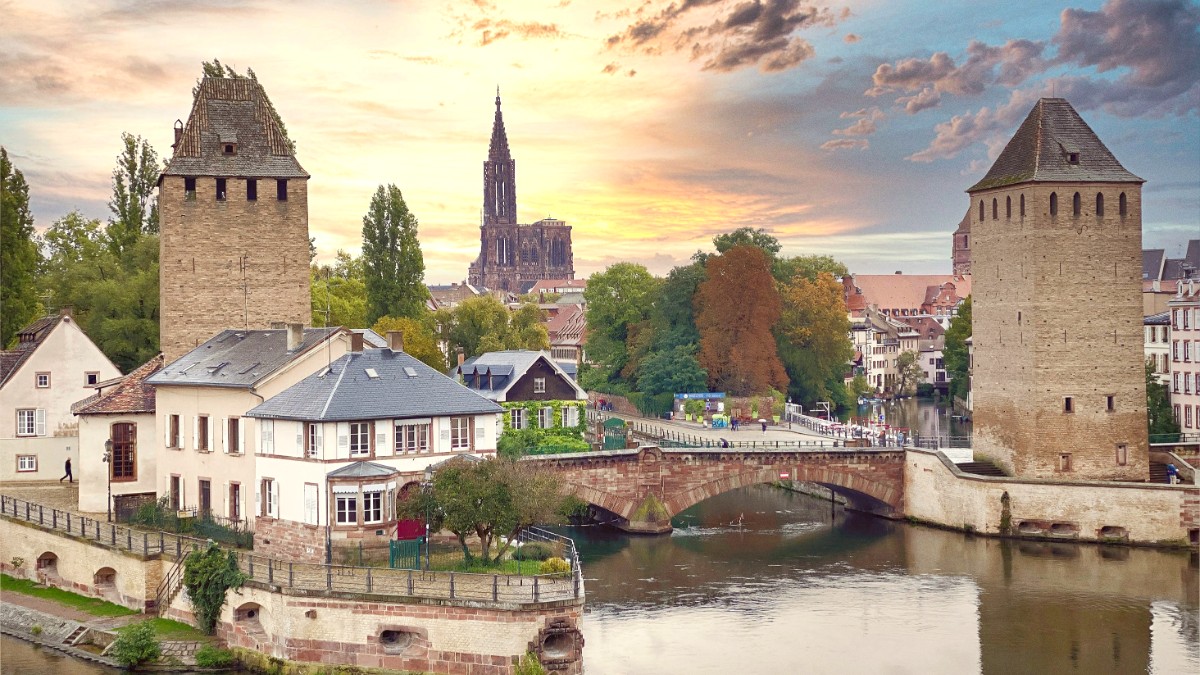
Alsace And Lorraine, France
Strasbourg has a semi-continental climate, with warm summers and cold winters, and moderate precipitation spread throughout the year.
Spring (April-May): Temperatures are mild and pleasant, averaging 15-20°C (59-68°F). Rainfall is moderate, with occasional showers. The city awakens with blossoming trees and flowers, ideal for walking tours.
Autumn (September-October): Average high temperatures are around 15-20°C (59-68°F). Less rain than spring. Vineyards turn golden, making it scenic for wine tours. Weather is agreeable for many visitors.
During summer, heatwaves can occur, with temperatures rising above 35°C (95°F). Stay hydrated by drinking plenty of water, seek shade during the hottest parts of the day, and wear light, breathable clothing.
Winters can bring snow and ice, making walking on cobblestone streets challenging. Wear appropriate waterproof footwear with good grip. Public transport might experience minor delays during heavy snowfall.
June-August & December
Warm weather for outdoor activities, magical Christmas market in December. All attractions operate with full or extended hours.
Highest accommodation and flight prices. Largest crowds, specifically in the historic center.
April-May & September-October
Pleasant weather with fewer crowds. Lower prices for accommodation and flights. Ideal for sightseeing, cycling, and wine route exploration.
Weather is less predictable, with chances of rain. Some attractions might operate with slightly reduced hours.
January-March & November
Lowest prices for travel and lodging. Experience the city with fewer tourists for an authentic local feel. Christmas markets begin in late November.
Coldest weather and shortest daylight hours. Some attractions may have limited hours or close for maintenance, especially in January and February.
Christmas Markets: Plan your visit between late November and December 31st to experience the Christkindelsmärik. This is a primary draw for winter visitors.
Wine Route Exploration: May to June offers beautiful blossoms and milder weather for exploring vineyards in the surrounding Alsace region. Early autumn also works well.
Cruises on the Ill River: These panoramic boat tours operate from spring through autumn. Best views are often in spring or early autumn when temperatures are comfortable.
Outdoor Activities/Cycling: May to September brings the most agreeable weather for cycling through the city or exploring nearby parks and forests.
Christkindelsmärik (Christmas Market)
Wine Route exploration, vineyard visits
Ill River boat cruises
Cycling and outdoor activities
Fewer crowds, pleasant weather
France is a member of the Schengen Area, a zone of 27 European countries with abolished border control at their mutual borders.
Non-EU/EEA/Swiss citizens typically require a Schengen visa for stays exceeding 90 days within any 180-day period. Many nationalities, including citizens of the USA, Canada, Australia, and the UK, are visa-exempt for stays up to 90 days for tourism or business.
Always carry the listed documents. Border officials might request them upon entry into the Schengen Area.
For Schengen Visa Applicants, additional documents are required: a completed visa application form, recent passport-sized photos meeting Schengen requirements, a detailed travel itinerary, proof of accommodation (hotel bookings, invitation letter), a letter from your employer or school, recent bank statements showing financial stability, and travel insurance policy documents.
No general entry fees for tourists entering France. Standard immigration procedures apply upon arrival at your first point of entry into the Schengen Area. This involves presenting your passport and potentially answering questions about the purpose and duration of your visit. No special permits are generally required for typical tourist activities in Strasbourg or Alsace. For professional photography or large-scale events, research specific local regulations.
Completed and signed.
Recent, passport-sized, meeting Schengen criteria.
Outlining your travel plans.
Hotel bookings or invitation letter.
Recent bank statements.
Costs vary based on your travel style and preferences. These daily cost estimates exclude long-haul flights to France.
The official currency in Strasbourg, and throughout France, is the Euro (€, EUR).
Optimize your budget with these local tips.
Daily costs vary by travel style:
A breakdown of typical costs you might encounter.
France boasts a high-quality healthcare system. A well-stocked personal health kit prepares you for minor ailments and keeps you comfortable during your trip.
Ensure routine vaccinations (MMR, DTP, Polio, Flu) are up to date. Consult a doctor 4-6 weeks before travel.
Low risk in France. Practice good hand hygiene, especially before eating. Tap water is safe.
Stay hydrated, seek shade during summer heatwaves, wear light clothing.
No specific vaccinations are required for entry to France.
Tick-borne Encephalitis (TBE) & Lyme Disease are possible in forested areas during spring/summer. Use insect repellent and check your body after outdoor activities.
During colder months, colds and flu are common. Dress warmly in layers and maintain good hand hygiene.
Consult your doctor or a travel clinic for personalized advice.
EU/EEA/Swiss citizens carry EHIC for state-provided healthcare at reduced cost or free.
Highly recommended for all non-EU/EEA/Swiss visitors. Covers medical emergencies, evacuation, trip cancellation, and baggage loss. Compare policies from World Nomads, SafetyWing, or Insubuy.
Recognizable by a green cross. Pharmacists offer advice for minor ailments. University Hospital of Strasbourg is a major public medical center.
Strasbourg is generally safe for residents and tourists. Petty crime, like pickpocketing, can occur in crowded tourist areas.
Familiarize yourself with emergency contacts before you go.
112: All emergencies (Europe-wide)
17: Police (Police Secours)
18: Fire Brigade (Sapeurs-Pompiers)
15: Medical Emergency (SAMU)
Report to local police immediately. Obtain a police report. Contact your country's embassy or consulate in France for replacement. US citizens have a consulate in Strasbourg.
Keep a copy of your passport and visa (if applicable) separate from originals. Store digital copies on your phone and in a cloud service.